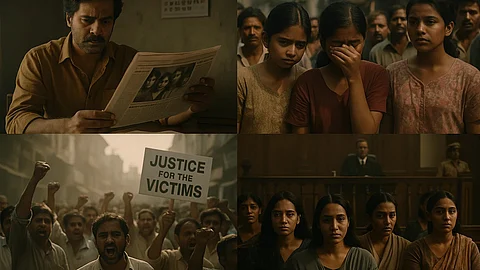
- Union Budget 2026
- Home
- NewsGram USA
- India
- न्यूजग्राम
- World
- Politics
- Entertainment
- Culture
- Lifestyle
- Economy
- Sports
- Sp. Coverage
- Misc.
- NewsGram Exclusive
- Jobs / Internships

Journalist Santosh Gupta from Dainik Navjyoti exposed the Ajmer rape case in 1992.
Between 1990 and 1992, over 100 schoolgirls aged 11-20 were raped and blackmailed by a group led by Farooq and Nafis Chishti
In 2024, a POCSO court sentenced six accused to life imprisonment with ₹5 lakh fine.
Between 1990 and 1992, more than 100 schoolgirls, aged 11 to 20, were raped and blackmailed by a group of young men led by Farooq and Nafis Chishti. In 2024, a Protection of Children from Sexual Offences (POCSO) court in Rajasthan delivered a verdict against six of the accused involved in the rape case, sentencing them to life imprisonment.
The Beginning of the Ajmer Rape Case
In 1990, a Class 12 student aspiring to join the Congress party was introduced to the influential Chishti brothers, Farooq and Nafis Chishti, who promised to help her enter politics using their influence and connections. After assuring her of assistance, they took her to their farmhouse, where she was sexually assaulted and blackmailed to remain silent.
What followed was a series of similar incidents, where young girls were raped and blackmailed into silence using compromising pictures and videos. The Ajmer rape case came to light in 1992 when journalist Santosh Gupta from Dainik Navjyoti exposed it after a local photo lab leaked nude pictures of the victims, sparking public outrage and leading to a police investigation. The case gained widespread attention, leading to a shutdown in Ajmer on May 18, 1992.
Farooq Chishti befriended another girl from Sophia Senior Secondary School, Ajmer, and took obscene photos of her, which he used to force her into introducing him to other girls. The Chishti duo, closely associated with the Ajmer Sharif Dargah, along with their associates, exploited more than 100 girls over the span of two years.
Prosecution lawyer Virendra Singh Rathore stated that the accused used their power and influence to threaten and trap their victims. The primary perpetrators, Farooq and Nafis Chishti, held prominent positions in the Ajmer Youth Congress, with Farooq as president and Nafis as vice president.
18 individuals were charged with abduction, gang rape under the Indian Penal Code, and violations of the Indecent Representation of Women (Prohibition) Act. After the Supreme Court rejected the appeals filed by both the state and convicts in 2004, later on a bench comprising Justice N. Santosh Hegde and Justice B.P. Singh reduced the life sentence to 10 years consequently leading to their release after serving.
Farooq Chishti was initially diagnosed with schizophrenia, but a fast-track court convicted him in 2007. While the Rajasthan High Court upheld the conviction, it reduced his sentence, leading to his release in 2013.
See Also:
The police records were not complete, consisting of outdated addresses which made it difficult to maintain contact with survivors. Victims were often summoned to court even decades after the scandal. A gang rape survivor was summoned to court again in 2021, she said that, "I am now a grandmother; leave me alone. We have families. What do we tell them?"
The six accused—Nafees Chishti, Naseem (alias Tarzan), Salim Chishti, Iqbal Bhati, Sohail Ghani, and Syed Zameer Hussain—were found guilty of these heinous crimes. In 2024, POCSO court judge Ranjan Singh sentenced them to life imprisonment and imposed a fine of ₹5 lakh each.
A movie was made on the same rape sandal that took place in Ajmer in 1990. Ajmer 92 is a 2023 crime/ drama movie based on true events, directed by Pushpender Singh and is distributed by the Reliance entertainment.
With rising cases emerging involving Pakistani grooming gangs especially in Britain, including the most recent incident of a teenage Sikh girl being abducted and gang-raped—the focus has once again shifted to the notorious Ajmer case.
During a discussion with author and scientist Anand Ranganathan on News18 on January 12, 2026, the concerning pattern of Pakistani grooming gangs was highlighted, where underage girls are targeted, seduced, and then raped.
Ranganathan recalled the Ajmer grooming case, which was allegedly attempted to be brushed under the rug by being labelled a “figment of imagination by journalists and the opposition.” He further grouped offences such as love jihad and grooming jihad together and said, “It doesn’t matter what you call it. What matters is whether these offences happen and the answer is yes.”
Ranganathan stated that such offences continue to occur not only in the UK or India but across the world. “The day a democratic nation decides to be multi-religious, with one of the religions being Islam, its fate is sealed. It will inevitably turn uni-religious,” he said.
Suggested Reading:
